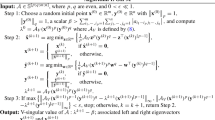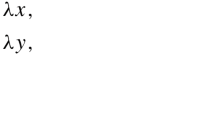Abstract
The strong ellipticity condition (abbr. SE-condition) of the displacement equations of equilibrium for general nonlinearly elastic materials plays an important role in nonlinear elasticity and materials. Qi et al. (Front Math China 4(2):349–364, 2009) pointed out that the SE-condition of the displacement equations of equilibrium can be equivalently transformed into the SE-condition of a fourth-order real partially symmetric tensor \({\mathcal {A}}\), and that the SE-condition of \({\mathcal {A}}\) holds if and only if the smallest M-eigenvalue of \({\mathcal {A}}\) is positive. In order to judge the strong ellipticity of \({\mathcal {A}}\), we propose a shifted inverse power method for computing the smallest M-eigenvalue of \({\mathcal {A}}\) and give its convergence analysis. And then, we borrow and fine-tune an existing initialization strategy to make the sequence generated by the shifted inverse power method rapidly converge to a good approximation of the smallest M-eigenvalue of \({\mathcal {A}}\). Finally, we by numerical examples illustrate the effectiveness of the proposed method in computing the smallest M-eigenvalue of \({\mathcal {A}}\) and judging the SE-condition of the displacement equations of equilibrium.





Similar content being viewed by others
Data Availability
We do not analyze or generate any datasets, because our work proceeds within a theoretical and mathematical approach.
References
Bertsekas, D.P.: Nonlinear Programming, 2nd edn. Athena Scientific, Belmont, Massachusetts (1999)
Che, H., Chen, H., Wang, Y.: M-positive semi-definiteness and M-positive definiteness of fourth-order partially symmetric Cauchy tensors. J. Inequal. Appl. 2019, 32 (2019)
Che, H., Chen, H., Wang, Y.: On the M-eigenvalue estimation of fourth-order partially symmetric tensors. J. Ind. Manag. Optim. 16(1), 309–324 (2020)
Che, H., Chen, H., Xu, N., Zhu, Q.: New lower bounds for the minimum M-eigenvalue of elasticity M-tensors and applications. J. Inequal. Appl. 2020, 188 (2020)
Che, H., Chen, H., Zhou, G.: New M-eigenvalue intervals and application to the strong ellipticity of fourth-order partially symmetric tensors. J. Ind. Manag. Optim. 17(6), 3685–3694 (2021)
Chen, H., He, H., Wang, Y., Zhou, G.: An efficient alternating minimization method for fourth degree polynomial optimization. J. Global Optim. 82, 83–103 (2022)
Chirita, S., Danescu, A., Ciarletta, M.: On the strong ellipticity of the anisotropic linearly elastic materials. J. Elast. 87, 1–27 (2007)
Ciarlet, P.G.: Mathematical Elasticity, Volume I: Three-Dimensional Elasticity. Society for Industrial and Applied Mathematics, Philadelphia (2022)
Ding, W., Liu, J., Qi, L., Yan, H.: Elasticity M-tensors and the strong ellipticity condition. Appl. Math. Comput. 373, 124982 (2020)
Fichera, G.: Existence theorems in elasticity. In: Truesdell, C. (eds.) Linear theories of elasticity and thermoelasticity. Springer, Berlin (1973). https://doi.org/10.1007/978-3-662-39776-3_3
Han, D., Dai, H.H., Qi, L.: Conditions for strong ellipticity of anisotropic elastic materials. J. Elast. 97, 1–13 (2009)
Han, D., Qi, L.: A successive approximation method for quantum separability. Front. Math. China 8(6), 1275–1293 (2013)
He, J., Li, C., Wei, Y.: M-eigenvalue intervals and checkable sufficient conditions for the strong ellipticity. Appl. Math. Lett. 102, 106137 (2020)
He, J., Liu, Y., Xu, G.: New S-type inclusion theorems for the M-eigenvalues of a 4th-order partially symmetric tensor with applications. Appl. Math. Comput. 398, 125992 (2021)
He, J., Liu, Y., Xu, G.: New M-eigenvalue inclusion sets for fourth-order partially symmetric tensors with applications. Bull. Malays. Math. Sci. Soc. 44(6), 3929–3947 (2021)
He, J., Xu, G., Liu, Y.: Some inequalities for the minimum M-eigenvalue of elasticity M-tensors. J. Ind. Manag. Optim. 16(6), 3035–3045 (2020)
Huang, Z.H., Li, X., Wang, Y.: Bi-block positive semidefiniteness of bi-block symmetric tensors. Front. Math. China 16(1), 141–169 (2021)
Knowles, J.K., Sternberg, E.: On the ellipticity of the equations of nonlinear elastostatics for a special material. J. Elast. 5(3–4), 341–361 (1975)
Knowles, J.K., Sternberg, E.: On the failure of ellipticity of the equations for finite elastostatic plane strain. Arch. Ration. Mech. Anal. 63(4), 321–336 (1976)
Li, M., Chen, H., Zhou, G.: Fourth-order partially symmetric tensors: theory and algorithm. Pac. J. Optim. 18(1), 233–264 (2022)
Li, S., Chen, Z., Liu, Q., Lu, L.: Bounds of M-eigenvalues and strong ellipticity conditions for elasticity tensors. Linear Multilinear Algebra 70(19), 4544–4557 (2022)
Li, S., Li, C., Li, Y.: M-eigenvalue inclusion intervals for a fourth-order partially symmetric tensor. J. Comput. Appl. Math. 356, 391–401 (2019)
Li, S., Li, Y.: Programmable sufficient conditions for the strong ellipticity of partially symmetric tensors. Appl. Math. Comput. 403, 126134 (2021)
Li, S., Li, Y.: Bounds for the M-spectral radius of a fourth-order partially symmetric tensor. J. Inequal. Appl. 2018, 18 (2018)
Li, S., Li, Y.: Checkable criteria for the M-positive definiteness of fourth-order partially symmetric tensors. Bull. Iran. Math. Soc. 46, 1455–1463 (2020)
Ling, C., Nie, J., Qi, L., Ye, Y.: Biquadratic optimization over unit spheres and semidefinite programming relaxations. SIAM J. Optim. 20(3), 1286–1310 (2009)
Liu, K., Che, H., Chen, H., Li, M.: Parameterized S-type M-eigenvalue inclusion intervals for fourth-order partially symmetric tensors and its applications. J. Ind. Manag. Optim. 19(5), 3060–3074 (2023)
Liu, L., Wang, G., Zhang, Z., Liu, S.: Bound estimations of bi-block M-eigenvalues for bi-block symmetric tensors. J. Ind. Manag. Optim. 19(8), 6244–6263 (2023)
Qi, L., Chen, H., Chen, Y.: Tensor Eigenvalues and Their Applications. Springer, Singapore (2018)
Qi, L., Dai, H.H., Han, D.: Conditions for strong ellipticity and M-eigenvalues. Front. Math. China 4(2), 349–364 (2009)
Rosakis, P.: Ellipticity and deformations with discontinuous gradients in finite elastostatics. Arch. Rational Mech. Anal. 109, 1–37 (1990)
Sang, C., Zhao, J.: Criteria for the strong ellipticity condition of a partially symmetric tensor. Acta Appl. Math. 180, 10 (2022)
Sheng, Z., Ni, Q.: Computing tensor Z-eigenvalues via shifted inverse power method. J. Comput. Appl. Math. 398, 113717 (2021)
Wang, C., Wang, G., Liu, L.: Sharp bounds on the minimum M-eigenvalue and strong ellipticity condition of elasticity Z-tensors. J. Ind. Manag. Optim. 19(1), 760–772 (2023)
Wang, G., Sun, L., Liu, L.: M-eigenvalues-based sufficient conditions for the positive definiteness of fourth-order partially symmetric tensors. Complexity 2020, 2474278 (2020)
Wang, G., Sun, L., Wang, X.: Sharp bounds on the minimum M-eigenvalue of elasticity Z-tensors and identifying strong ellipticity. J. Appl. Anal. Comput. 11(4), 2114–2130 (2021)
Wang, W., Li, M., Che, H.: A tighter M-eigenvalue localization set for fourth-order partially symmetric tensors. Pac. J. Optim. 16(4), 687–698 (2020)
Wang, X., Che, M., Wei, Y.: Best rank-one approximation of fourth-order partially symmetric tensors by neural network. Numer. Math. Theor. Meth. Appl. 11(4), 673–700 (2018)
Wang, Y., Qi, L., Zhang, X.: A practical method for computing the largest M-eigenvalue of a fourth-order partially symmetric tensor. Numer. Linear Algebra Appl. 16(7), 589–601 (2009)
Yao, Y., Wang, G.: Sharp upper bounds on the maximum M-eigenvalue of fourth-order partially symmetric nonnegative tensors. Math. Found. Comput. Sci. 5(1), 33–44 (2022)
Zhang, Y., Sun, L., Wang, G.: Sharp bounds on the minimum M-eigenvalue of elasticity M-tensors. Mathematics 8(2), 250 (2020)
Zhao, J.: Conditions of strong ellipticity and calculations of M-eigenvalues for a partially symmetric tensor. Appl. Math. Comput. 458, 128245 (2023)
Zhao, J., Luo, Y., Sang, C.: A direct method for calculating M-eigenvalues of an elasticity tensor. Japan J. Indust. Appl. Math. 41, 317–357 (2024). https://doi.org/10.1007/s13160-023-00598-3
Zubov, L.M., Rudev, A.N.: On necessary and sufficient conditions of strong ellipticity of equilibrium equations for certain classes of anisotropic linearly elastic materials. Z. Angew. Math. Mech. 96(9), 1096–1102 (2016)
Acknowledgements
The authors are very grateful to the anonymous reviewers for their insightful comments and constructive suggestions, which considerably improve our manuscript. The authors also thank Associate Professor Qilong Liu (Guizhou Normal University) for his discussions and suggestions during the revision of the manuscript.
Funding
This work of Jianxing Zhao is supported by Guizhou Provincial Science and Technology Projects (Grant No. QKHJC-ZK[2022]YB215). This work of Caili Sang is supported by Guizhou Provincial Science and Technology Projects (Grant No. QKHJC-ZK[2021]YB013) and Natural Science Research Project of Department of Education of Guizhou Province (Grant Nos. QJJ[2023]012; QJJ[2023]061; QJJ[2023]062).
Author information
Authors and Affiliations
Corresponding author
Ethics declarations
Conflict of interest
The authors declare that they have no conflict of interest.
Additional information
Communicated by Liqun Qi.
Publisher's Note
Springer Nature remains neutral with regard to jurisdictional claims in published maps and institutional affiliations.
Rights and permissions
Springer Nature or its licensor (e.g. a society or other partner) holds exclusive rights to this article under a publishing agreement with the author(s) or other rightsholder(s); author self-archiving of the accepted manuscript version of this article is solely governed by the terms of such publishing agreement and applicable law.
About this article
Cite this article
Zhao, J., Liu, P. & Sang, C. Shifted Inverse Power Method for Computing the Smallest M-Eigenvalue of a Fourth-Order Partially Symmetric Tensor. J Optim Theory Appl 200, 1131–1159 (2024). https://doi.org/10.1007/s10957-023-02369-z
Received:
Accepted:
Published:
Issue Date:
DOI: https://doi.org/10.1007/s10957-023-02369-z
Keywords
- Displacement equations of equilibrium
- Partially symmetric tensors
- Strong ellipticity condition
- M-eigenvalues
- Shifted inverse power method




